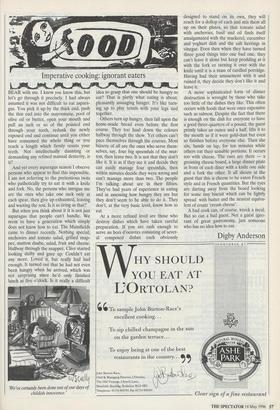BEAR with me. I know you know this, but let's
go through it precisely. I had always assumed it was not difficult to eat aspara- gus. You pick it up by the thick end, push the thin end into the mayonnaise, pool of olive oil or butter, open your mouth and pull an inch or so of the pointed end through your teeth, redunk the newly exposed end and continue until you either have consumed the whole thing or you reach a length which firmly resists your teeth. Not intellectually daunting or demanding any refined manual dexterity, is it?
And yet every asparagus season I observe persons who appear to find this impossible. I am not referring to the pretentious twits who pathetically try to eat it with a knife and fork. No, the persons who intrigue me are the ones who take one suck only at each spear, then give up ,exhausted, leaving and wasting the rest. Is it as tiring as that?
But when you think about it it is not just asparagus that people can't handle. We seem to have a generation which simply does not know how to eat. The Mansfields came to dinner recently. Nothing special; anchovies and tomato salad, grilled snap- per, mutton daube, salad, fruit and cheese. Halfway through the snapper, Clive started looking shifty and gave up. Couldn't eat any more. Loved it, but really had had enough. It turned out that he had not even been hungry when he arrived, which was not surprising since he'd only finished lunch at five o'clock. Is it really a difficult `We've certainly been done out of our days of childish innocence.' idea to grasp that one should be hungry to eat? That is partly what eating is about, pleasantly assuaging hunger. It's like turn- ing up to play tennis with your legs tied together.
Others turn up hungry, then fall upon the home-made bread even before the first course. They too haul down the colours halfway through the show. Yet others can't pace themselves through the courses. Most bizarre of all are the ones who serve them- selves, say, four big spoonfuls of the mut- ton, then leave two. It is not that they don't like it. It is as if they see it and decide they can easily manage four spoonfuls, then within minutes decide they were wrong and can't manage more than two. The people I'm talking about are in their fifties. They've had years of experience in eating and in assessing how hungry they are but they don't seem to be able to do it. They don't, at the very basic level, know how to eat.
At a more refined level are those who destroy dishes which have taken careful preparation. If you are rash enough to serve an hors d'oeuvres consisting of sever- al composed dishes each obviously designed to stand on its own, they will reach for a dollop of each and mix them all up on their plates, so that tomato salad with anchovies, basil and oil finds itself amalgamated with the mackerel, cucumber and yoghurt dish and the salt herrings in vinegar. Even then when they have turned three good things into one bad one, they can't leave it alone but keep prodding at it with the fork or turning it over with the knife until it is a mass of curdled porridge. Having had their amusement with it and ruined it, they decide they don't like it and leave it.
A more sophisticated form of dinner destruction is wrought by those who take too little of the dishes they like. This often occurs with foods that were once expensive such as salmon. Despite the fact that there is enough on the dish for everyone to have a good three-quarters of a pound, the guest primly takes an ounce and a half, lifts it to the mouth as if it were gold-dust but even so finishes before everyone else. Then she sits, hands on lap, for ten minutes while others eat their sensible portions. It occurs too with cheese. The cues are there — a groaning cheese board, a large dinner plate in front of each diner with a knife one side and a fork the other. It all shouts at the guest that this is cheese to be eaten French style and in French quantities. But the eyes are darting away from the board looking for some tiny biscuit which can be lightly spread with butter and the nearest equiva- lent of ersatz 'cream cheese'.
A bad cook can, of course, wreck a meal. But so can a bad guest. Not a guest igno- rant of great gastronomy, just someone who has no idea how to eat.
Digby Anderson


































































 Previous page
Previous page